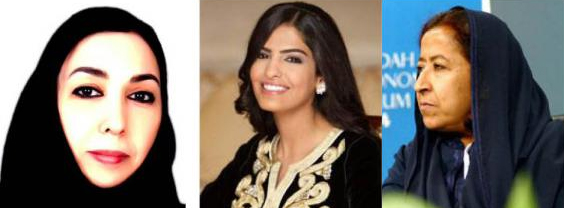
Jeddah, Mar 7: Fifteen Saudi women who are breaking new grounds in the social, educational, economic, political and cultural fields have been named in the list of the world’s 100 most powerful Arab women, published this week by CEO Middle East. The highest Saudi entry was second place Lubna Olayan, while Princess Ameerah Al-Taweel and Mona Al-Munajjed ranked third and ninth, respectively. UAE Minister for Foreign Trade Sheikha Lubna Al-Qasim tops the list.
As the CEO of Olayan Financing Company, Lubna Olayan is one of the Kingdom’s most distinguished businesswomen. Earlier this year, Olayan was part of a high-profile panel comprising some of the world’s most powerful women, in a discussion on the “glass ceiling”. Commenting on the need to empower Arab women, Olayan said, CEOs across Arab countries should be persuaded to hire and mentor women, because their contribution is vital to the growth and development of the region’s economy.
She is also involved with academic institutions such as INSEAD, King Abdullah University of Science and Technology (KAUST) and Effat College for Women.
Princess Ameerah, vice-chairwoman and secretary general of the Alwaleed Bin Talal Foundation, is known for a wide range of philanthropic work in Saudi Arabia and around the world and is a leading advocate for improving the image of Saudi woman.
She is a member of the board of trustees at the Doha-based Silatech organization, and formally opened the Prince Alwaleed Bin Talal Center for Islamic Studies at Cambridge University in the UK in 2011.
Al-Munajjed, a sociologist and a high-profile women’s rights activist, has worked with several local NGOs and UN agencies. Her impressive resume includes working as a senior adviser at Booz & Co. in Riyadh between 2008 and 2011, writing in-depth reports on social issues in the Arab region. She received the UN-21 Award for excellence, outstanding coordination and individual productivity in 2005.
Other prominent Saudi women featured in the list are novelist and journalist Badriya Al-Bishr (17), filmmaker Haifa Al-Mansour (22), medical researcher and Shoura Council member Hayat Sindi (24), and Thoraya Ahmed Obaid (26), another member of the Shoura Council and the first Saudi national to head a UN agency in 2000.
Nahed Taher, CEO of Gulf One Investment Bank and the only woman in the Gulf to head a bank, which she co-founded in 2005 and Dr. Samia Al-Amoudi, a top obstetrician, gynecologist and assistant professor at King Abdulaziz University in Jeddah, a breast cancer survivor herself who helped spread awareness about the disease, were 27th and 28th, respectively.
Also in the list are Khawla Al-Kuraya, a physician-scientist specializing in cancer (43), activist Manal Al-Sharif (59), Mona Kazindar (73), the first Saudi ever to be appointed director general of the Institut du Monde Arabe, Nashwa Taher (80), director of the Al-Taher Group, and Lama Al-Sulaiman (85), the first woman to be elected as the deputy chairwoman of the Jeddah Chamber for Commerce and Industry (JCCI) in 2009.






Comments
Add new comment